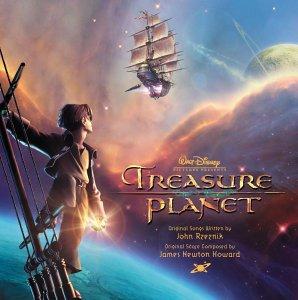Treasure Planet
Music composed by James Newton Howard
Conducted by Pete Anthony
Songs by John Rzeznik
Available on Enhanced Disc DISNEY RECORDS 60799-7
Running Time: 54:51
Amazon UK Amazon US

Skipping past Goo Goo Dolls front man John Rzeznik's composition on teen angst, 'I'm Still Here (Jim's Theme)', and the liberated 'Always Know Where You Are' (with BBMak), we hear James Newton Howard's latest journey into Disney animated adventure. The score to Treasure Planet is a solid swashbuckler, with the heroic fanfares, comic scuttling, and intense snarling that Robert Louis Stevenson's classic, and certainly oft retold, "Treasure Island" story traditionally inspires. Only, interstellar sailing is now on the itinerary... Young Jim Hawkins comes of age amidst black holes, supernovas, and a cyborg John Silver, during a treasure hunt across deep space.
Thematically, the soundtrack is predictable but pleasant. It fits right alongside Howard's Dinosaur and Atlantis: The Lost Empire. Erich Wolfgang Korngold, Dimitri Tiomkin, and Max Steiner are vaguely acknowledged in the spacefaring flourishes, aficionados may be pleased to hear that Holst's "The Planets" receives a subtler homage than usual, and there are would-be chanteys with whistles, fiddle, and pipes. Contemporizing the elements, and linking them into Rzeznik's songs, is a tasteful use of electric guitars. And to round out this soundscape, Howard employs (if you haven't already guessed) a celestial choir. These cosy effects are enjoyable, even exciting, from the briefly meditative 'To the Spaceport' through the Jerry Goldsmith-lite 'The Map', and onward in an eclectic mix from the rousing 'The Launch' to the comedic 'Ben' to the satisfying finale (co-composed by fiddler Alasdair Fraser). It is a sign of the music's success that James Newton Howard's Treasure Planet ultimately sounds neither old nor new, but functions like a retrospective of sorts, bridging a gap between 'now' and 'then'. As drama, this means the soundtrack does not fully articulate one of its crucial elements: adventure. It does, however, provide enough to be great fun.
CD-ROM enhancements on the album feature Internet links and the 'I'm Still Here' music video. Since Rzeznik's creative stylings do not exactly set my spirit alight, I cannot personally justify facing a prompt every time I pop the disc into the computer. Presented in a surprisingly flashier manner, the booklet includes lyrics, detailed credits in an "Oh, my eyes!" font, movie stills, and related publicity. Just don't bother looking for track times. The score has a digital edge to its sound, yet that too seems to be in keeping with the old-fashioned take on the future.
Jeffrey Wheeler
4
Return to Index